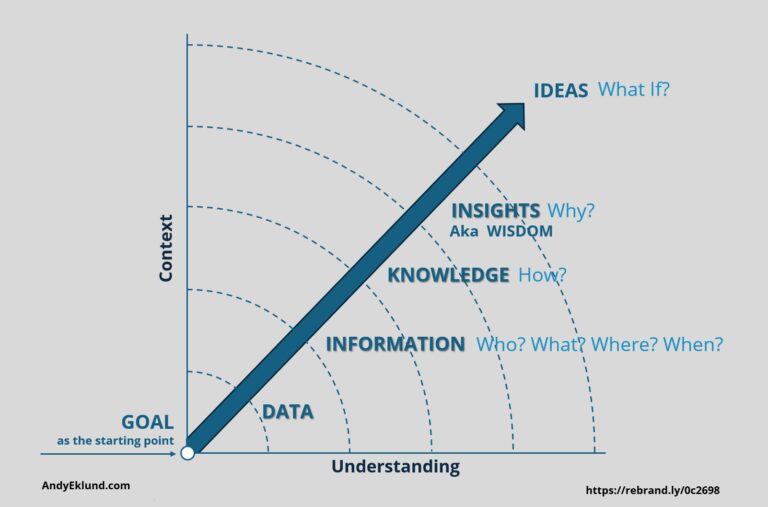An earlier post – – brought me lots of thoughts and comments around the topic of Information vs. Knowledge vs. Intelligence. All the feedback centred around one question: Is knowledge helpful or hurtful?
Here’s three thoughts.
1. Information, knowledge and intelligence are not the same thing
Knowledge, intelligence, and information are words tossed around as similar concepts, and they’re not at all synonyms.
Information
… is what you have selected from all the data in the world. It’s the first step of research, but it’s usually general, not (yet) specific.
As we all know, of the initial things found in research gathering, some are good, some bad, some makes you think of something else. “Good information” is labelled such because you probably think it’ll help you accomplish something. (Maybe.) More so, information is useless until you do something with it, which is called an insight. (What’s the information mean?) An insight turned into an action is an idea, also not yet good nor bad.
Knowledge
… is information that you know. You’ve learnt it, in school or through experiences. As people suggested in their responses to the original post, knowledge can be both good and bad. Yes, that’s true.
This link to How Knowledge Helps is specific to childhood learning, but there’s a wealth of good information about how knowledge attracts even more knowledge.
Intelligence
… is your ability to act upon the knowledge, to make decisions. It’s a in making ideas. Intelligence helps you frame and extract insights from what you know.
Here’s an example. While playing Trivial Pursuit with friends, someone said I was “intelligent” because I knew the capital of Turkey was Ankara, not Istanbul. I wasn’t demonstrating my intelligence. I was demonstrating my knowledge. (Frankly, I was surprised I remembered it.)
All of these things are in a linear process called The Information Chain, which is how we transform information into ideas.
To the right, I stole my own chart from that article to show the differences.
2. Think of knowledge as fuel to create ideas.
Knowledge is all that marvellous information inside your head (much of it forgotten – like Ankara – but still there). Your brain needs it to ignite the imagination, perhaps even as material to create ideas. The more knowledge you have, the more potential fuel you have for more ideas.
As author H.G. Schnackel said, “Any addition to the individual’s store of usable experience is potential material for the exercise of the imagination.”
Here’s an example. “That reminds me …” is a classic phrase said during brainstorming. It’s your brain remembering a piece of knowledge. In a nanosecond, your intelligence took over. Your brain used the original piece of information to adapt and mould it into a new idea through the power of association. It might not be a good idea or an original one – but it’s an idea nonetheless.
3. Yet, the more you know, the less creative you are.
While it can be helpful, knowledge also prevents creative thinking in two ways.
First, from a purely psychological aspect, the brain stores knowledge and the brain uses information and intelligence. They’re two separate functions. As Alex Osborn writes, “Mmnemonics (the things we use to remember things) wastes mental energy that could go into creative thinking.”
Second, a person can grow too comfortable with their knowledge. Each piece of information is in fact a piece of information about the past. Knowledge is what was. Information changes all the time – indeed, life does. So, “old” information may soon be out-of-date, irrelevant, or out of context in another situation. Being too close (biased) to a piece of information means we remain in the past.
Worse, we all know that it’s easy to find one piece of information that contradicts another piece of information. (You can thank the American political system for giving us “alternative facts.”)
Again, Osborn writes: “Creativity calls for forward thinking. Although creative imagination uses the materials of previous experience, the chief aim is not to reproduce the past – on the contrary, it is to avoid reproducing the past.”
So the answer - is knowledge helpful or hurtful - is YES and NO.
In conclusion – yes, continue to build your knowledge. Keep learning. Go to training. Stay curious!
At the same time, remember that it’s more important to think how knowledge can be used, adapted and moulded to create ideas for the future, not to hold on to the past.
Is knowledge helpful or hurtful? What’s your opinion? Please add your thoughts and comments below.


2 Comments
I think knowledge is information we obtain that could be stocked in our mind for future questioning and such needs while intelligence is more on logic and reasoning. Well, just wanna share my thoughts here!
I can see why you think that, although it wouldn’t be difficult to make a case that knowledge can also be logical and based on reasoning. My point was to show that it’s good to be knowledgeable about many subjects, but it’s even more important HOW you use that knowledge to make ideas. People say “knowledge is power,” but it’s not. It’s how you use that knowledge: that’s the real power.
Your great question reminded me of an anecdote one of my first professors said. “Information” is all of the food stuffs in the world. “Knowledge” is the distinct foods you select to make a good meal. “Intelligence” is the difference in how you combine and cook the ingredients to make the meal superb.